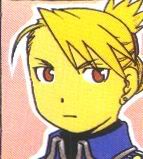
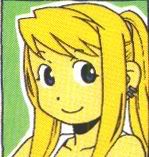
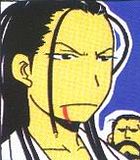
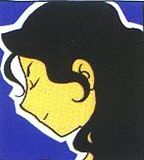
Because of work situations, last week I had to see all the 51 episodes of the Full Metal Alchemist anime, and read all that was available of the manga, which led me to three very important conclusions.
First: A 51 marathon chased with 59 manga episodes read in a week is not a good idea no matter what. By episode 12 I was ready to throw my DVD out of the window.
Second: They shouldn’t make anime based on manga that haven’t revealed at least the first half of their main plot. FMA, the anime, suffers from a lot of incoherencies because it is obvious that the animators were trying to add the stuff that was being shown in the manga, months after they had already given an answer to questions that their plot needed (The Gate, for example)
Third: Maybe I’m being a bit too feminist, but I think that the main difference between manga and anime is that the manga was written by a woman, while the anime staff is mainly male.
Let me elaborate.
One of my main problems with manga lately is that if one scratches the surface just a little, there are very few active females as main characters. The vast majority are very passive, even if the story moves around them. A quick glance to my personal collection shows a lot of girls who are dependant on their male friends, boyfriends and even enemies to solve their problems (Not all manga are like this, but it is a notorious trend, especially in shojo manga) .
FMA manga is different. It is a manga with a big male cast, a lot bigger than the female cast, but there isn’t a single female character that has more than two lines that is completely passive. In fact, I can only think of two passive girls –the kind that wait for things to happen to them, rather than make things happen- in the whole manga.
Yes, at first sight the girls do look alike in the manga and in the anime. In the anime, Riza is a woman in love and nothing more than the second in command of Roy –who does very few besides standing next to him. Winry tends to stick with the Elric brothers for no reason –besides her love for Ed; Maria Ross disapears after a few episodes; Martel is murdered while she hides, scared and trembling, inside Al; Lust stops being a villian because of the love she remembered for Scar’s brother; and Izumi Curtis, who is arguably the strongest woman in the manga, has maternal instincts attacks that make her act in amazingly stupid ways as soon as anime!Wrath appears (And here I could go on and on about how Japanese authors seem to think a mother should act, remembering what happened in Silent Hill: The movie, but I better let that subject lie)
In the manga, however, no woman is secondary to the man next to her. The best examples are Lust, who up to the moment of her death is an evil, manipulative bitch; Riza, who is not only Roy’s ‘right hand’, but is obviously his equal in all but range –it’s more obvious in the latter chapters that Roy does think of her as an equal and not as an inferior- and who can hold her own in a fight in closed quarters with Gluttony; Izumi, who is the only person without automail who manages to fight Greed hand to hand; and finally Ran Fan, a manga only character, who even cuts her own arm to fulfill her duty to her country.
And the villians. In the manga, the main villian is a man, who looks a lot like the Elric’s father, whose motives to create homonculi, control the country and create a new Philosopher’s Stone (because unless I’m mistaken, he has managed to create 7) are still a mistery. In the anime is Dante, a woman who is looking to create a new Philosopher’s Stone because she wants to keep her youth and beauty just as she has for the last 400 years and for that reason she kills people by the thousands and keeps the country at war. Oh, and she hates her ex because he left her for another woman. Could she be more stereotypical and lame? The old ‘I want to be forever beautiful’ was already old when the Queen gave Snow White a poisoned apple, and the variations haven’t been many.
I’m not saying that the members of the anime studio are misogynistic, or anything like that. I’m saying that it’s very funny the way that the characters- both male and female- change completely when a man writes them.
Let’s go back to Izumi, since she’s the most obvious case.
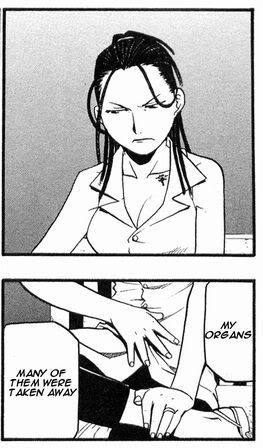
In the manga she explains to the Elric brothers that when she tried to create a baby, she ‘lost some of her insides’, but her hand in the general area of the stomach and her expression… they make hard to think that she’s not referring to her uterus. It’s her husband, Sig, who explains why she tried to transmute a human: She aborted, lossing the chance to have children forever, feeling guilty and “Saying sorry all night, even when it wasn’t her fault”. The idea that Izumi felt guilty because she didn’t fullfill her duty to her husband is clear- and even understandable since many women are educated with the idea that they have to ‘marry and have children for her husband’. Despite all, Izumi stays strong and she learned from her mistakes. She’s motherly with the Elric brothers, but she doesn’t forget the price of her mistake, and she keeps her use of alchemy to things that really matter (Not including, btw, the fight with Greed. She does that with her bare hands) And all this makes one of her most emotive scenes the moment when she thanks Ed for his discovery about human transmutation (I won’t explain exactly what it was to avoid more spoilers) Izumi here is a woman first, then an alchemist, then a mother.
In the anime, after seeing her vomit blood in front of her students and in one of the weirdest moments in the anime, a doctor tells us that she lost ‘many organs from her stomach to her intestine’, which causes the vomiting. The first question is, of course, How does she manage to survive without ‘many organs’? And the second is Why did she did it? Because her husband made her abort. And she felt guilty and tried to resuscitate the kid.
Well, We see the difference, right? Both in the extent of her sacrifice – she sacrifices more in the anime, but her manga loss is more symbolic- as well as the reasons why. In the anime her husband took the choice out of her hands ‘to save her life’, but she was ready to die to give her son a chance. The choice wasn’t made by her. And that added to her reaction to Wrath, the mystery boy that only exists in the anime and who is the result of her attempt to bring her son back. Izumi knows that Wrath is an homunculus, that he’s dangerous and that she must kill him. Despite that, she protects him, defending him from the army and almost letting him kill her because he is her ‘son’. And this was the same woman who pretended to leave two kids in a deserted island to teach them alchemy, and who greets them and trains them by flipping them in the air by fliking her wrists, who suddenly lets a kid almost choke her because he is ‘her sin’ and isn’t able to kill something that maybe sorta has her unborn son’s face –maybe sorta because when she saw him, it was a fetus. An aborted fetus. Wrath doesn’t look like her at all. He looks like Envy’s younger brother. So Izumi in the anime is mother first, then alchemist… and then we remember she’s a woman because if she wasn’t, she couldn’t be a mother.
The saddest part of all this is that FMA was, in its manga version, a very good show with strong female characters who weren’t stereotypes, a rare thing in a shonen manga, but in the anime… for time, plot necessity, or just ignorance, they became stereotypes.
Oh, and to end this without misunderstandings. I am sure that the differences in characters were because the anime was written by guys. But I’m not saying a man can’t write well a female character. Just that he will write her differently from what a woman will write the same character (And of course, the thing also works the other way. A woman will write a male character differently from a male writer)

2 comments:
I wonder if this still follows with Marta/Martel... I heard that the anime actually expanded her role than the brief appearances in the manga. She was actually my favorite character in the show, despite being a minor one. Like Izumi, she went through and overcame a ton of pain, and is also self-reliant and a powerful, skilled fighter. Her drive for revenge wasn't really boiled down to a stereotypical "love" reason, but had a lot of things from her past going into it.
(Ack, got to be careful with spoilers...)
Even though she doesn't stay in the show for very long, she still makes a heroic sacrifice that does serve a purpose even if she's never mentioned again... she delivers to the Elrics and the audience a crucial revelation. I wish she stayed and had a bigger role, but it could've ended a lot worse than it did. (Of course, that still doesn't let FMA off the hook for how their coolest characters fare. :P)
I don't suppose you know how Martel differs from the manga and anime? I know she's a minor character...
Actually, Martel suffers the same fate as every girl in the show (I should have mentioned her because she's very cool. My bad). In the manga she brings a very different revelation to Al -since the audience gets the other revelation a little before thanks to Greed- she dies in exactly the same place -and way- the main difference is that in the manga she never leaves Al's body because while she is trying to get out and fight to help/save her companions, Al doesn't let her because they asked him to help her escape. Then, after immobilizing Greed (Greed dies in a very different way in the manga), the guy who killed everyone and is just a different sin in the manga isn't aware that she is inside Al, until she decides to control Al's arm and try to kill him, and then this guy kills her inside Al. It's a little tiny difference, but for me it's important that in the anime she dies hiding, and in the manga she dies trying to avenge her companions.
(And yes, the problem with spoilers... I hope I was clear enough since I couldn't use a lot of names)
Post a Comment